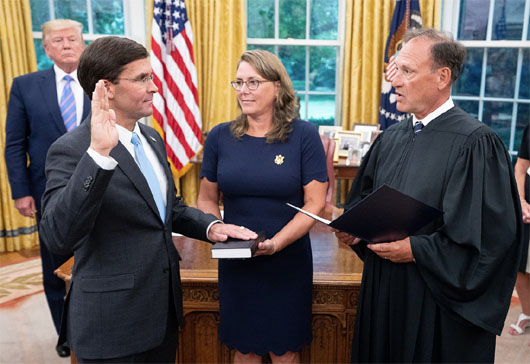Special to WorldTribune.com
 By Donald Kirk
By Donald Kirk
SEOUL — South Korea officially wants the U.S., officially, to stop complaining, officially, about the South Korea decision to pull out of GSOMIA, the General Security of Military Information Sharing Agreement with Japan under which these two U.S. allies shared vital intelligence info.
That’s what South Korea’s first vice foreign minister, Cho Sei-Young, told the American ambassador, Harry Harris, the retired admiral who once commanded all U.S. forces in the Pacific. The Americans, it seems, should refrain from saying what they think about an obviously foolish act of vengeance ordered by President Moon Jae-In.

Certainly the Americans have vented their feelings frankly. Both Defense Secretary Mark Esper and a spokesperson for Secretary of State Mike Pompeo have warned the decision weakens security in Northeast Asia and heightens the risks for American forces in both countries.
They’re still hoping against hope that somehow South Korea and Japan can patch up their differences, at least to the point of reversing the decision before it officially expires on Nov. 23, 90 days from August 23 when South Korea formally notified Japan it would not be renewing the deal on intel-sharing.
Cho summoned Harris to the foreign ministry for the purpose not of talking about ways to strengthen the Korea-U.S. alliance but to ask him to tell those people in Washington to shut up. It would not be “helpful,” as he put it, for senior U.S. officials to persist in saying what they believed.
Who would imagine South Korea would try to tell the U.S. in no uncertain terms to stop talking? Is it proper for a government to tell another government to tone down comments that were offered not as rhetorical outbursts but as reasoned opinions about the consequences of the South Korean action?
Related: Seoul scraps intelligence-sharing pact with Tokyo in blow to U.S. alliance, August 23, 2019
One can imagine the response of Ambassador Harris, who probably knows more than most other higher-ups about the need for trilateral cooperation, that is, for South Korea, Japan and the U.S. to coordinate with each other on defense. The Americans are fully aware that South Korea and Japan are never going to join in a formal alliance with each other but did hope their separate alliances with the U.S. would enable all three to join in a showdown with the enemy.
Moon’s decision reflects not only the impossibility of real cooperation but also quite a differing conception of who’s the enemy. In the past year and a half of off-and-on-again visitations, talks, rhetoric and summitry, he has ceased to see North Korea as hostile at all.
Related: North Korea to Seoul: Cancel intel-sharing pact with Tokyo, Aug. 6, 2019
In the face of North Korean missile tests, North Korean insults and the North’s failure to do away with its nukes and missiles as promised in his own meetings with Kim Jong-Un and Kim’s summits with President Donald Trump, Moon persists in turning the other cheek. No, he’s hasn’t said anything as silly as Trump’s declarations of friendship, even “love,” with Kim, but his hopes for real rapprochement are just as absurd.
Instead, Moon prefers to give the impression that Japan, the still imperial and former colonial power, guilty in the Pacific War of enslaving hundreds of thousands of Koreans, including as many as 200,000 comfort women, is again a force to fear. While worrying about flagging popular support and a slowly weakening economy, Moon has been playing the Japan card as a dangerous distraction from problems at home.
Given that agenda, Moon would hope the U.S. would understand, appreciate and respect his policy of deepening the wedge between Korea and Japan. That’s not going to be possible while the U.S. also has to mollify the Japanese, notably Prime Minister Shinzo Abe. For the Americans, failure to renew GSOMIA represents the defeat of years of attempts at bridging the gap between Korea and Japan.
It’s not hard to guess how Harris would have responded to Vice Foreign Minister Cho’s request. No doubt he promised to pass along the official Korean view that U.S. officials must shut up on the whole topic of GSOMIA. He undoubtedly was terribly polite as he agreed on the need for mutual understanding. He had to have said he fully appreciates Korean sensitivities.
Not that Harris revealed any of this conversation publicly. All we surmise is deduced from the foreign ministry’s own report on the meeting in which Cho said GSOMIA had nothing to do with the U.S.-Korean alliance and the two would go on working together.
The Americans, in Seoul and Washington, uttered not a word about the meeting. It’s not hard to guess, though, what they thought of the Koreans thinking they could get them to remain silent on what constitutes a huge setback in the fantasy of real trilateral cooperation.
